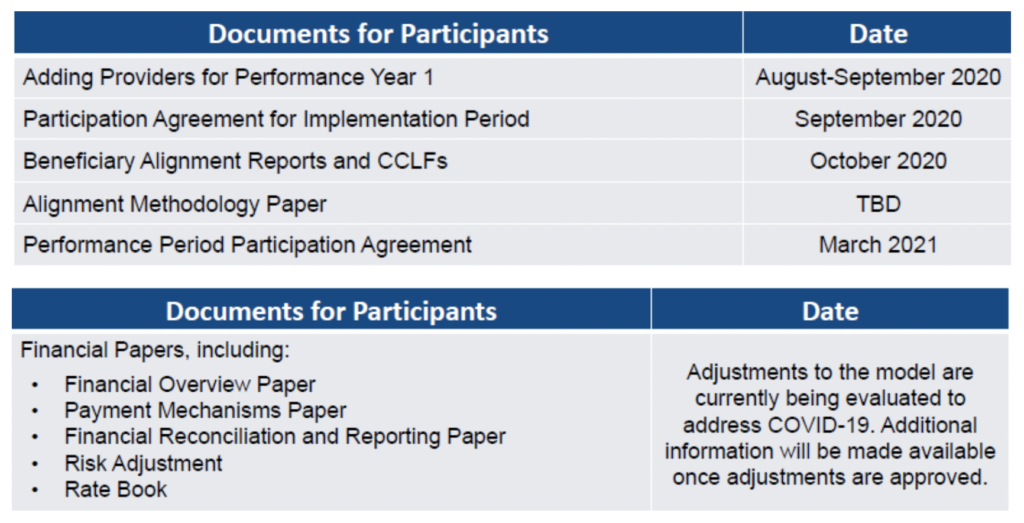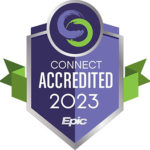
June proved to be a month of updates from Center for Medicare & Medicaid Innovation (CMMI) regarding the Kidney Care Choices (KCC) models.
As a quick acronym rundown before we get started, the KCC models include:
- Kidney Care First (KCF)
- Comprehensive Kidney Care Contracting (CKCC) Graduated Model
- Comprehensive Kidney Care Contracting (CKCC) Professional Model
- Comprehensive Kidney Care Contracting (CKCC) Global Model
Earlier in the month, CMMI made the following high-level announcements:
- Due to the COVID-19 Public Health Emergency (PHE), the start of the KCC Model has been delayed by three months.
- Accepted applicants will have the option of beginning to take risk on 4/1/2021 (PY1), or they may defer until 1/1/2022 (PY2) without submitting another application.
- There will be a second round of applications during the spring of 2021 for a 1/1/2022 start intended for those who did not have the option to apply in this cycle.
- Regardless of the start date, KCC models will end on 12/31/2025.
- For those applicants who wish to begin taking risk 4/1/2021, there will be a 6-month implementation period (10/1/2020 – 3/31/2022). There is no financial risk during the implementation period.

- Payment Year 5 (PY5) of the ESCO program will be extended to 3/31/2021.
- The ESCO will still be considered an Advanced APM during 2020, but not in 2021.
- The ESCO extension to 3/31/2021 will not impact Qualifying Participant (QP) status in 2021, however, the Kidney Care First (KCF) and CKCC (Professional and Global Options only) are considered Advanced APMs in PY1.
- Absent clarity regarding the QP calculation for KCC, it is difficult to comment on the likelihood of achieving QP status in 2021 with a 4/1/2021 start date, but if the QP calculation is similar to that used for the ESCO program, those starting 4/1/2021 will likely achieve QP status for CY 2021.
- Deferring KCC model start until 2022 means the practice will likely face MIPS in 2021.
- For current ESCO participants, shared savings in PY5 will be capped at 5%.
- If an ESCO is in a loss position in PY5, that loss will be reduced by what amounts to the number of months the COVID-19 PHE lasts. We need more detail here, but what was described is this, if the PHE includes half of the performance year and the ESCO faces a loss in PY5, that loss will be reduced by 50%.
- CMMI created a website specific to COVID-19 flexibilities, which included the table below.

In addition, last Thursday (June 25), CMMI held a KCC model kick-off meeting during which they introduced the team that would be managing the KCC models and shared an overview of timelines and next steps.
The presentation was followed by a Q&A session. Insights of interest that emerged during the call include:
- For the first time CMMI announced a rough estimate of the number of applications they received, stating that they reviewed just over 100 Kidney Care First (KCF) applications and just under 100 Kidney Care Entity (KCE or Comprehensive Kidney Care Choices/CKCC) applications. They noted substantial overlap (practice names on both KCF and CKCC). They also mentioned very few applications were rejected.
- They reiterated the timeframes noted in the points above, although as opposed to declaring the model would end 12/31/2025, they restated what was in the RFA (end date 12/31/2023, with an option for 2 additional years).
- They set expectations regarding dates applicants could expect to see participation agreements. If you elect to start on 4/1/2021:
- Expect to see the Implementation Period Participation Agreement in September 2020
- Expect to see the Performance Year Participation Agreement in March 2021
- Assuming you start 4/1/2021, during the 6-month implementation period (10/1/2020 – 3/31/2021)
- You will see the alignment file.
- You will see our benchmark.
- You will begin receiving claims files.
- You can add a transplant provider if you don’t have one.
- You can work on strategies to improve our patient counts if you are below the minimums.
- A practice on both a KCF and CKCC application can sign Implementation Period Participation Agreements for both and, during the implementation period, decide which entity to participate in during the performance years, or decide not to participate in either model.
- If you start 4/1/2021, during August and September of 2020, there will be an opportunity to add other nephrologists to your application for PY1.
- CMMI has been working on an “overlap” strategy that will span all models. They are not prepared to announce the strategy yet, but this will be very important for CKCCs that operate in geographies with active ACOs.
- CMMI will be hosting the following upcoming webinars. Those scheduled for July:
- Participant management: 7/9/2020
- Alignment methodology: 7/16/2020
- Quality measures and reporting: 7/30/2020
- CMMI will also release a number of documents just prior to the implementation start date:

- Last, but certainly not least, CMMI acknowledged they have heard feedback from multiple stakeholders regarding aspects of the model outlined in the RFA and that in response to that feedback they have made changes to the model. They did not reveal those changes during the call but will do so during the appropriate upcoming webinars.
There are still a lot of details that still need to be uncovered (such as risk adjustment and quality measure information), however it appears additional webinars are being scheduled to help color the picture. They asked participants to hold onto any questions relevant to future webinar topics until those webinars conclude.
If you are interested in receiving additional information and updates about the KCC Model and future webinar information, you can subscribe to the KCC listserv or ask questions at KCF-CKCC-CMMI@cms.hhs.gov.
Sounds like it will be a busy late summer/early fall for everyone involved to understand all the moving parts. What are your thoughts about the recent announcements? Did you jump into the KCC waters? Let us know in the comments below!
 Diana Strubler, Policy and Standards Senior Manager, joined Acumen in 2010 as an EHR trainer then quickly moved into the role of certification and health IT standards subject matter expert. She has successfully led Acumen through three certifications while also guiding our company and customers through the world of Meaningful Use, ICD-10 and PQRS.
Diana Strubler, Policy and Standards Senior Manager, joined Acumen in 2010 as an EHR trainer then quickly moved into the role of certification and health IT standards subject matter expert. She has successfully led Acumen through three certifications while also guiding our company and customers through the world of Meaningful Use, ICD-10 and PQRS.
Photo by Ross Sneddon on Unsplash




Leave a Reply